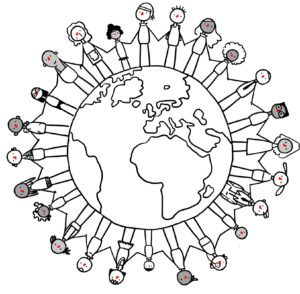According to the British Social Attitudes Survey (BSAS) over half the population of the UK are non-religious (52% in 2018). The 2021 census revealed a slightly lower figure of 37% of the population. One possible explanation for this is that the census asks the slightly weighted question of ‘What is your religion?’ For more about some of the misconceptions associated with the census data see Setting the record straight on Census 2021. What all surveys agree on, however, is that there has been a significant rise in non-religious identification over the last 40 years.
The BSAS also reveals significant diversity between age groups, with a greater proportion of young people describing themselves as non-religious (64% of those aged 18-24 years). The 2021 census agreed, revealing that a majority of those people aged 66 or under are non-religious. This might lead some people to the conclusion that people must become more religious as they get older, but other research does not appear to support that. For every person brought up in a non-religious household who becomes religious, 19 people travel in the opposite direction (St Mary’s University, 2017). Each generation is becoming less religious than the one before.
According to the BSAS, in the UK between 1983 and 2018:
No. Not all the people who tick the non-religious box are the same. Not all will share humanist beliefs and values. Some may even hold religious beliefs (such as believing in a god or an afterlife). However, most don’t. It is important to recognise that there is also diversity within those who identify as religious: some people have a religious sense of identity (perhaps for cultural reasons or a sense of family belonging), however, they do not hold the associated religious beliefs (e.g. they may not believe in a god). There are people who identify as religious, but who have humanist beliefs.

Around 5% of the UK population self-identify as humanist. However, many more demonstrate humanist beliefs when asked whether they believe in a god, how they make ethical decisions, and whether they look to science or religion to understand the universe around them (surveys show this is probably around 20% of the population).
Many of those who hold humanist beliefs and values don’t use the word ‘humanist’ to describe themselves because they are unaware of the label or what it means. The label ‘humanist’ can be employed differently from labels such as ‘Christian’ or ‘Muslim’. Religious labels are often applied before or during the formation of associated beliefs, while many humanists discover the label later in life and realise it applies to the beliefs and values they already held. When the meaning of the label is described to them, many, but not all, are happy to apply the label to themselves.
Today, humanists can be found all over the world – in Europe, Asia, Africa, and the Americas. Humanists International has member organisations in over 60 countries.
For more information and graphs on how many humanists there are see our resources in the data area.
Humanists UK
39 Moreland Street
London EC1V 8BB
education@humanists.uk
@HumanismEdu

© Humanists UK 2025. Registered Charity No. 285987
humanists.uk | Privacy
Illustrations by Hyebin Lee